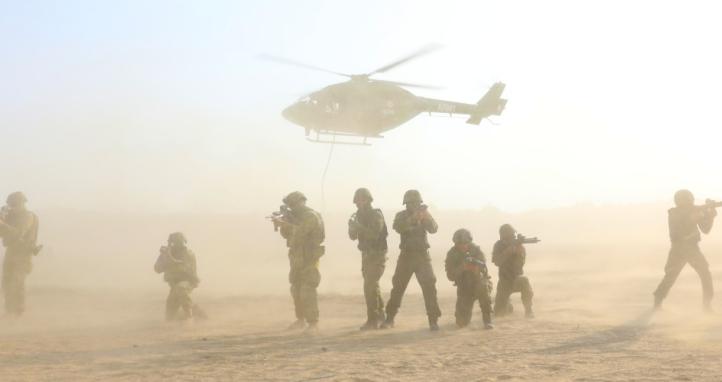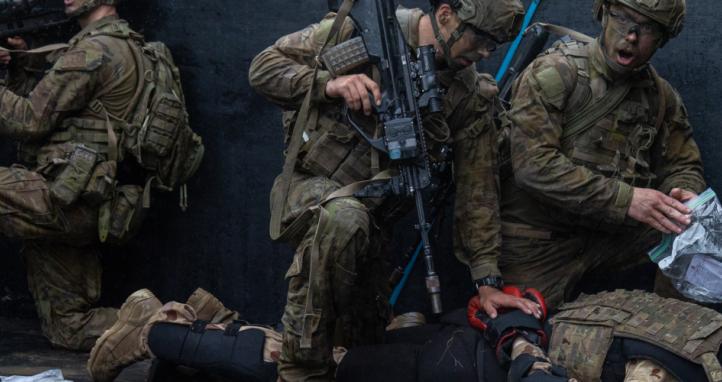Facts and figures
| Official name | People's Republic of China |
| Country code | CN |
| Area | 9,706,961km2 |
| Coastline | 14,500km |
| Population | 1,402,112,000 |
| Capital city | Beijing |
| Timezone | UTC+08:00 |
| GDP | $USD 17,794.78 billions |
| Currency | CNY (Chinese yuan ¥) |
| Government type | Communist Party-led State |
| Notable people |
|
The 'Know Your Region' series is designed to support unit and individual professional military education on the South East Asian region. It's important for all serving members of our military to have a foundational knowledge of the countries and issues in the Indo-Pacific.
CHINA – INFORMATION
On this page:
- China overview
- Culture/demographics
- National psyche
- Public diplomacy
- Media and the internet
- Comms and tech
- International forums
China Overview
China (officially the People's Republic of China) is the world's most populous country, with a population of around 1.4 billion. With an area of approximately 9.6 million square km, it is the world's third largest country. The country is officially divided into 23 provinces, five autonomous regions, four direct-controlled municipalities (Beijing, Tianjin, Shanghai, and Chongqing), and two special administrative regions (Hong Kong and Macau). China is nominally a unitary one-party socialist republic; it is the world's fastest growing economy, second wealthiest nation in the world and the world's largest manufacturer and exporter. This YouTube explainer proves an excellent overview of China's demographics:
Culture/Demographics
Ancient Chinese culture is older than 5000 years. Chinese cultural history has enormous diversity and variety. The sophisticated Chinese civilisation is rich in the arts and sciences, elaborate painting and printing techniques and delicate pottery and sculpture. Chinese culture managed to retain its unique identity until the advent of Western culture in the mid-19th century.
For further information on China's culture see the resources below:
- Videos
- Podcasts
- Articles
National Psyche
Chinese modern thinking is founded on the teachings of ancient Chinese philosophers such as Confucius (Confucianism), and Lao Tzu (Taosim), ancient military and administrative strategies, and more recently, New Confucianism.
It is embedded in every aspect of Chinese people’s life, including art, literature, political and military strategy, business, medicine and so on. Some key differences in the way China thinks, compared to Western cultures are detailed here, and summarised in the graphic below.

For further reading on China's psyche, see the resources below:
- Videos
- Podcasts
- Articles
Intelligence Agencies
Unlike some more commonly known intelligence agencies such as ASIS, the UK’s MI6 , Israel’s MOSSAD and the USA’s CIA, very little is known or confirmed about China’s Intelligence agencies. It is believed to comprise the Ministry of State Security (MSS) and the Ministry of Public Security (MPS), both of which fall under the parent organisation the State Council of the PRC. The video below gives a limited insight into Chinese secret services:
For further information on China's Intelligence agencies see the resources below:
- Videos
- Podcasts
- Articles
- The Ministry of Public Security
- Chinese Intelligence Agencies
- The Distinctive Case of Chinese intelligence Services
- Ministries of security, Strategic Support Force – China’s intel agencies and how they operate
- Russia as a hurricane, China as Climate Change: Different ways of information warfare
- Inside the US-China espionage war
- China’s misunderstood spies
Public Diplomacy
China switched from propaganda to public diplomacy in 1989 and public diplomacy is a huge part of China’s Foreign Policy as China becomes increasingly influential on the world stage. While the majority of China’s public diplomacy is state-led, an increasing number of Chinese individuals and civil society groups are now participating in global networks, bringing new dynamics and legitimacy to China’s public diplomacy. This video gives an insight into China’s changing approach to Diplomacy in 2021:
For further information on China's Public Diplomacy see the resources below:
- Videos
- Podcasts
- Articles
Media and the Internet
The Xinhua News Agency is the official state-run press agency of the PRC. It is also the largest and most influential News Agency in China. The official television broadcaster of China is the China Central Television network (CCTV) which is owned by Chinese state-media and provides over 50 television channels throughout the country. With a population of 1.4 billion, China presents as the world’s largest social media market, although several more commonly known social media applications are unavailable for use in the country. For an overview of what the media looks like in China watch this ABC video:
For further reading on China’s Media and the Internet see the resources below:
- Video channels:
- Podcasts
- PR Articles
- Internet Articles
- Social Media Articles
Comms and Tech
Chinese industries are rapidly expanding and increasing global competition in the areas of electronics, renewable energy, advanced nuclear energy, next generation telecommunication technologies, big data and supercomputers, AI, robotics, Space technology, and e-commerce. China has become a true global powerhouse, accounting for 40 percent of global e-commerce transactions (compared to just 1 percent a decade ago) and China’s high-tech export market is worth over 700 million USD annually. This video gives a small snapshot of some of the emerging advancements in Chinese Tech.
For further reading on China’s comms and tech see the resources below:
- Videos
- Podcasts
- Articles
- Securing the ICT and Services Supply Chain
- Understanding the Entities Listing in the Context of U.S China AI Competition
- Telecommunications industry in China – Statistics & Facts
- Institute of Scientific and Technical Information of China
- China by design: World-leading connectivity nurtures new digital business models
- Facing up to China’s state-led Tech revolution
- Building China’s Telecommunications Network
International Forums
As well as holding a permanent seat on the United Nations Security Council, which gives it veto power, China is a member of many international organisations and forums, including monetary and financial organisations, educational, scientific and sporting and cultural organisations. A full list of organisations in which the PRC is represented is here: The PRC in International Organizations (PDF).
For further reading on China’s involvement in international forums see the resources below:
- Videos
- Podcasts
- Articles
Discussion Questions
- China has a culture spanning 5000 years, and Australia has a little over 200 years of western recorded history. What would you consider are the key cultural differences between the two countries and how might these cultural differences impact ongoing understanding and relations?
- The Cultural Revolution removed old things, ideas, customs and habits, and suppressed any form of continued traditions. Since the late 1970s, China’s culture has rapidly grown to include many western influences. What kind of influences do you think this would have on a Communist political framework, and why?
- Social media companies in the West have received negative press in the past for their actions/inactions concerning social media involvement in US elections and the UK’s EU referendum. It is estimated that over half of US citizens receive their news from Facebook, and it is widely known that social media companies can have some control over the news people see each day. How does a social media company controlling a news feed differ from a government controlling what you is seen on social media? Noting that China’s blocking of Facebook in 2009 was reported to be in an effort to curtail communications among activists, do you think that the Chinese approach is the right one? Should all governments seek to regulate social media more?
- China has become a powerful force in global governance and is a key stakeholder in many international organisations. Beijing has used its influence at the UN to push some countries to adopt domestic cyber sovereignty or state-controlled internets, which challenge existing norms. Conversely, China has been a positive influence and key supporter of climate change and is the world’s biggest investor in renewable energy. In what other areas might China’s increasing influence within these organisations promote or challenge existing institutions and norms?
Last Reviewed 09/2024
Know your region
Know Your Region series gives you a shortcut to understanding other nations in the Indo-Pacific region.









